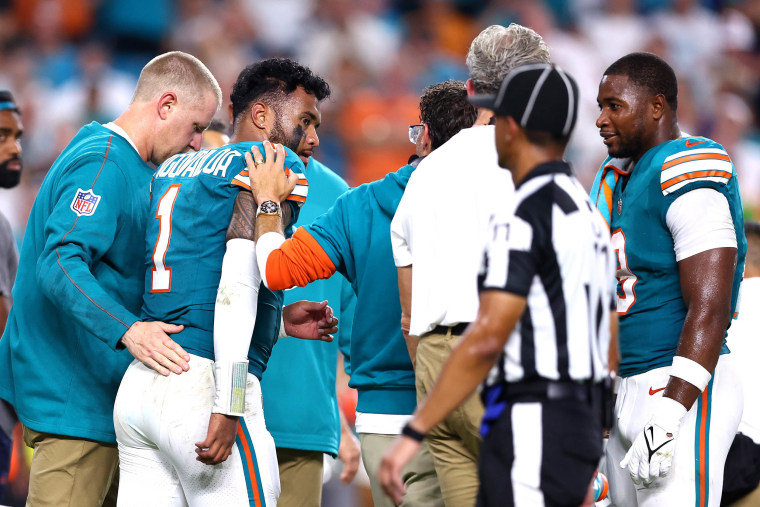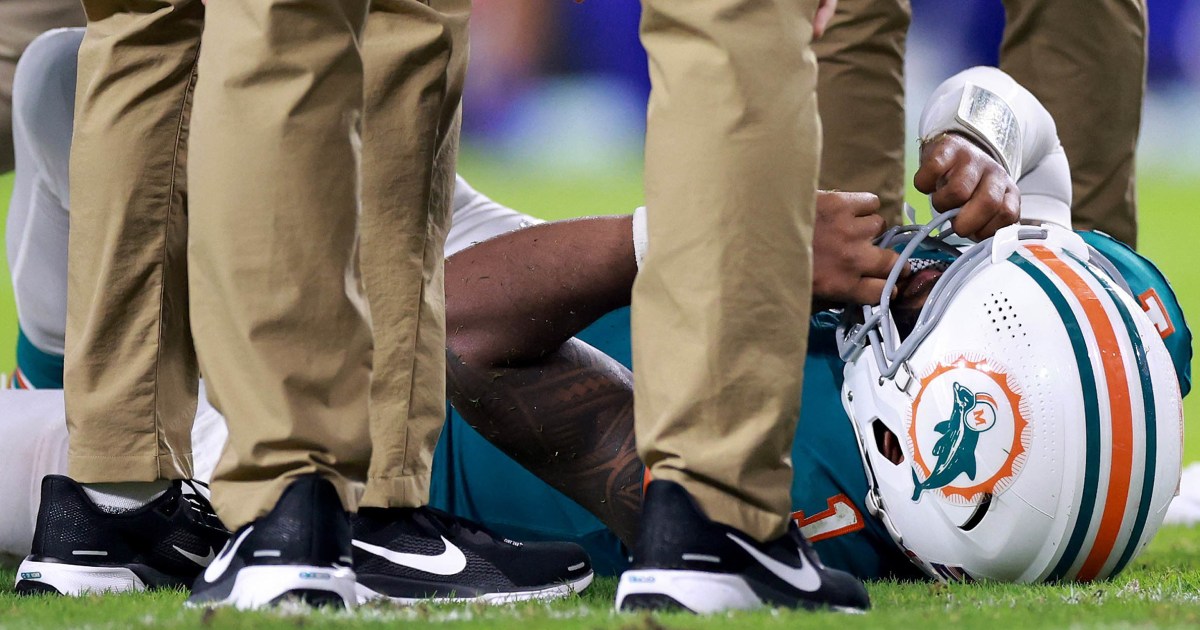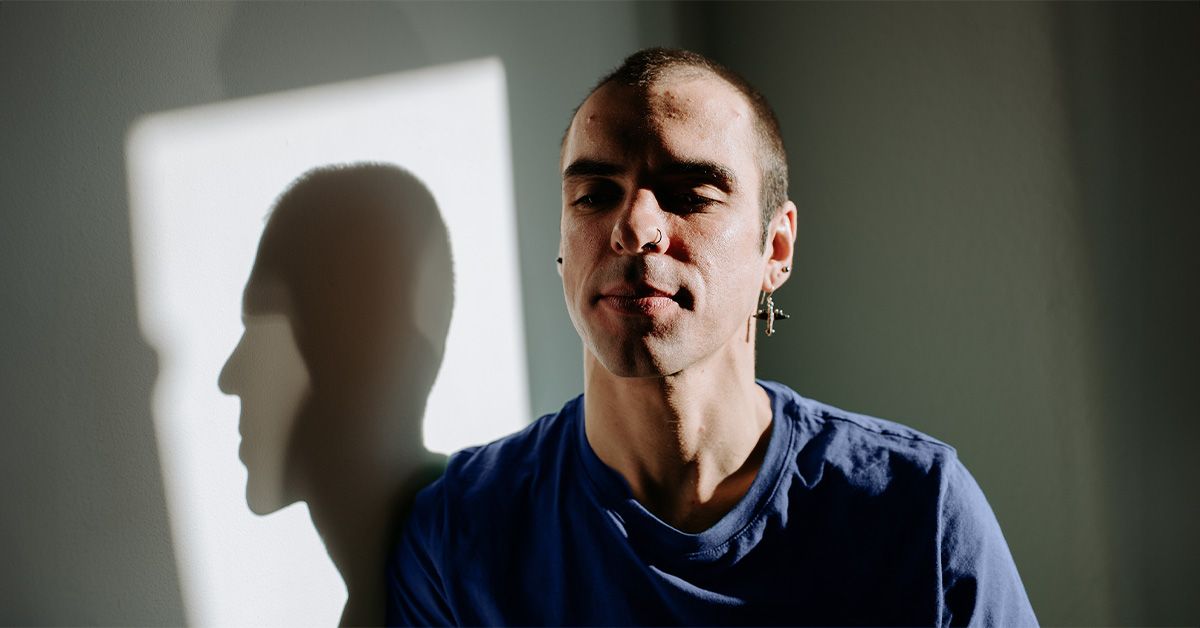Miami Dolphins quarterback Tua Tagovailoa sustained his third confirmed career concussion during the Sept. 12 NFL game against the Buffalo Bills, prompting many to wonder about the health of the 26-year-old professional football player and begging the question: How many concussions is too many?
During the third quarter, Tagovailoa collided with Bills safety Damar Hamlin and lay on the ground before eventually walking off the field on his own. He was alert and conscious after the hit and had full movement in his extremities, NBC News reported. There’s no clear timeline for his return, Dolphins coach Mike McDaniel said.
On Friday, McDaniel said it was unlikely Tagovailoa would play in the Dolphins’ next game, a week from Sunday against the Seattle Seahawks, NBC News reported. He added that he did not intend to give the quarterback any advice on whether he should retire.
“I think it would be so, so wrong of me to to even sniff that subject,” McDaniel said. “If I would answer that question, I’d be like, ‘All right, this is my thoughts on his career’ and he read it, if he agreed with it or he disagreed with it, either way, I’ve just made it worse.”

How many concussions has Tua Tagovailoa had?
Tagovailoa has had three confirmed concussions in his NFL career, which started in 2021.
Two of them were during the 2022 season, when he played in just 13 games due to his head injuries. The third was last night, on Sept. 12, 2024. He had no confirmed concussions in the last season.
After his first concussion, he displayed what’s known as the “fencing response,” a natural physiological reaction to sustaining a traumatic brain injury, which happens in over 50% of TBI cases in athletes, Dr. Dennis Cardone, sports medicine physician and co-director of the NYU Langone Concussion Center, tells TODAY.com.
However, Tagovailoa wasn’t evaluated for a concussion until four days after his first concussion, NBC News reported. After his second, he was diagnosed the next day. His third concussion was identified the same night, according to the Miami Dolphins social media.
Tagovailoa said that his parents asked him to consider retiring before starting this season, but he decided to play after speaking with a doctor.
How many concussions is too many?
This is a difficult question to answer, according to both experts TODAY.com spoke with.
Dr. Ramon Diaz-Arrastia, neurologist and director of Traumatic Brain Injury Clinical Research Center at Penn Medicine, says he usually will counsel his patients to consider quitting a sport after sustaining two concussions. But he stresses that his patients are usually amateur athletes, so it’s easier to advise them to step away when it’s not their livelihood.
His clinical guidance isn’t rooted in data but personal experience: He says he’s had patients never recover from just one concussion, and sustaining even a small number can lead to debilitating effects, such as disabling headaches, cognitive problems and more.
When it comes to the actual data on traumatic brain injury, both experts agree that the number of concussions isn’t the main factor in developing health problems.
Rather, it’s: “What’s the number of concussions (the patient has had) in a short period of time?” Cardone explains. “That’s actually even more concerning for us. And what are their symptoms? What have been their prolonged symptoms? And what’s the timeframe between concussions? How long does it take them to recover?”
That’s because the big concern for traumatic brain injuries is the risk that they’ll lead to chronic traumatic encephalopathy, also known as CTE — a degenerative brain disorder caused by repeated head trauma that can lead to cognitive impairment, behavioral changes and mood disorders, according to the Mayo Clinic.
And CTE doesn’t develop just from concussions, Cardone says. It can also be caused by what he calls “subconcussive blows,” or “repetitive blows to the head at a level that’s not even causing a concussion, but it’s cumulative, potentially over their career.”
These “subconcussive blows” are “more concerning, the data tells us, than the number of concussions,” Cardone explains.
What is the 3-concussion rule?
In 1952, the New England Journal of Medicine published a study on sports injuries, including in football, that stated that patients who’ve sustained a concussion more than three times “should not be exposed to further body-contact trauma,” according to the American Medical Association’s Journal of Ethics.
A study from January 2023 also found that “experiencing three or more concussions is linked with worsened brain function in later life,” according to researchers at the University of Oxford.
However, the Oxford researchers also found that as little as one moderate concussion can have long-term effects.
According to Cardone, there’s “misinformation” around the idea that it’s “three (concussions) and done.”
While the total number of concussions matters more in children, in adults, “we don’t have … good data to say that three or two or five is going to be that different, necessarily, in the short term. We need to look at all of these other factors.”
Can you recover from three concussions?
Simply put, it depends. Some people may recover from multiple concussions, and others may not.
“There are certainly people after several concussions — and a small number after even a single concussion — who never recover,” Diaz-Arrastia says.
For those who don’t recover, according to Diaz-Arrastia, some of the symptoms that develop after the concussion may include:
- Disabling headaches
- Memory problems
- Attention problems
- Extreme fatigue that prevents the person from fulfilling obligations
These symptoms can “definitely (happen) in some cases after only a small number of concussions, and that is a terrible thing,” he adds.
While in the short-term some patients may recover, the primary health concern is the effects decades later, Diaz-Arrastia says.
“What we have learned is that the cumulative effect of these head impacts often place itself out 10, 20, 30 years later in this really devastating neurological syndrome (CTE),” he explains.
But again, it’s important to keep in mind that it’s not just concussions that can lead to CTE.
“The clinically apparent concussions, like (Tagovailoa) sustained last night, are very dramatic and get everybody very concerned,” Diaz-Arrastia says. “But that’s not the only thing that we should be concerned about. It’s the … head impacts, which are very numerous, and over time, they add up.”
Read the full article here
















